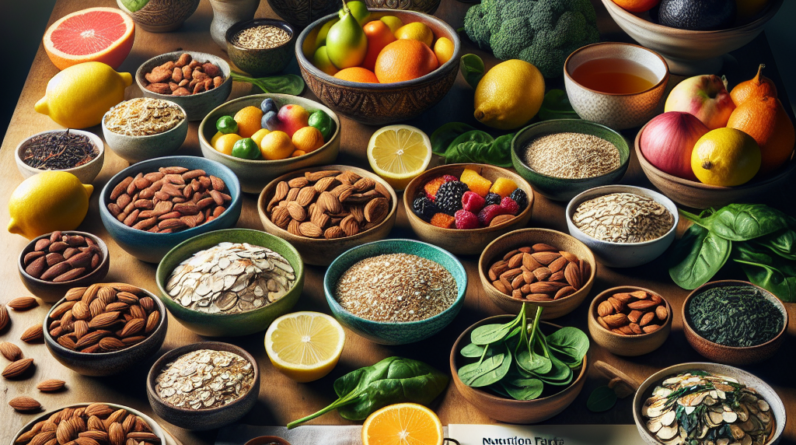
Nutrition’s Role in Physical Health
Understanding Macronutrients
When I first started looking into nutrition, I was amazed at how crucial macronutrients are in our daily lives. Proteins, fats, and carbohydrates work together to fuel our bodies. It’s more than just a meal; it’s sustaining your energy and overall vitality. You’ve gotta think of these nutrients as your body’s building blocks, contributing to everything from muscle repair to brain function.
Get a Huge Discount and Bonus! Try for 90 Days Risk Free
Each of these macronutrients serves a unique purpose. For instance, proteins are essential for muscle growth and repair. Healthy fats like avocados and nuts support heart health and brain function, while carbohydrates are your body’s preferred energy source. Find a balance that works for you, and you’ll feel the difference!
It’s super important to choose high-quality sources of these macronutrients. Think whole grains over processed snacks, lean meats versus fatty cuts, and healthy oils compared to trans fats. This switch can do wonders for your physical health and fitness journey.
The Importance of Micronutrients
Micronutrients often feel like the overlooked heroes in our diets, but they’re just as essential. Vitamins and minerals support almost every function in our bodies. For example, Vitamin D is crucial for bone health, and iron helps in transporting oxygen in the blood. It’s wild to think that just a slight deficiency can throw your body off balance!
One of the easiest ways to make sure I’m getting my vitamins and minerals is by adding a variety of colorful fruits and veggies to my meals. The more colors on your plate, the more nutrients you’re likely to get. Every color usually represents different nutrients and health benefits. So, load up that plate and enjoy the rainbow!
Don’t forget about supplements if needed, but it’s best to source these nutrients from whole foods whenever possible. For me, that’s led to a noticeable boost in how I feel day to day, both physically and mentally!
Hydration’s Impact
Let’s not underestimate the power of water! Staying hydrated is just as vital as what we eat. Water helps with digestion, absorption of nutrients, and even cognitive function. I’ve noticed on days when I’m not drinking enough, my energy dips, and my focus goes out the window!
When I think about hydration, I try to drink water throughout the day rather than guzzling a bunch at once. Keeping a water bottle close by is a simple trick that works wonders. I also love infusing my water with fruits like lemon or cucumber to make it a bit more exciting!
Also, remember that hydration doesn’t only come from water. Foods like fruits and soups contribute to your overall water intake. Keeping track of how much water you drink and noticing how it affects your mood and physical state can be an eye-opener.
Get a Huge Discount and Bonus! Try for 90 Days Risk Free
Good Health Solution is Easier Than Most People Think!
Take a Look for Yourself!
Diet and Mental Health
The Gut-Brain Connection
This one blew my mind when I learned about it—the gut-brain connection! The gut is sometimes called the “second brain” because it influences our mental health significantly. What we eat can impact our mood, anxiety levels, and even conditions like depression.
Foods that are rich in probiotics, like yogurt and fermented foods, can promote a healthy gut microbiome, leading to better mental health. I try to include these in my diet regularly. It feels great knowing I’m not only helping my body but also nurturing my brain!
Need a Serious Energy BOOST? Huge Discount Try for 90 Days Risk Free
Moreover, diets high in sugar and processed foods can lead to inflammation and mood swings. When I started cutting back on these foods, I noticed a significant improvement in my mood stability and overall mental clarity. It’s a game-changer!
The Role of Omega-3 Fatty Acids
Now, let’s talk about omega-3 fatty acids. These bad boys are a powerhouse for brain health. They play a vital role in cognitive function and emotional well-being. Simple tweaks, like adding salmon or flaxseeds to my meals, made a dramatic difference.
There’s even evidence suggesting that omega-3s may reduce the risk of mental health disorders. When I deliberately incorporate omega-3-rich foods into my diet, I genuinely feel more balanced and less anxious.
If you’re not a fish fan, no worries! There are plenty of plant-based alternatives available. Just remember to include these in your daily meals for that mental boost!
Mindful Eating Practices
Lastly, let’s touch on mindful eating. I used to rush through my meals, barely tasting what I was eating. But practicing mindfulness has transformed my relationship with food. Taking time to enjoy my meals helps me appreciate them more and makes me more in tune with my body’s hunger signals.
When I sit down and truly engage with my food—savoring each bite—I’m often left more satisfied and less likely to overindulge. Plus, it’s a wonderful practice for reducing stress. I find that this simple habit can greatly impact my mental state in moments of chaos.
Mindful eating encourages a sense of gratitude, making me appreciate where my food comes from and the effort that went into preparing it. It’s about savoring the experience, not just the food itself.
FAQ
- 1. How does diet affect physical health?
- A healthy diet provides essential nutrients that support bodily functions, energy levels, and weight management. The right balance of macronutrients and micronutrients ensures that each system in the body operates optimally.
- 2. Can my diet impact mental health?
- Absolutely! Foods rich in nutrients can enhance brain health and influence mood. Certain diets, like those high in omega-3 fatty acids, can reduce symptoms of anxiety and depression.
- 3. What are macronutrients?
- Macronutrients include proteins, fats, and carbohydrates—nutrients your body needs in larger amounts for energy, growth, and overall health.
- 4. How can I practice mindful eating?
- To practice mindful eating, take time during meals to savor each bite, minimize distractions, and listen to your body’s hunger signals. This approach enhances satisfaction and improves digestion.
- 5. What is the gut-brain connection?
- The gut-brain connection refers to the way our gut health impacts our mental health. A healthy gut can promote better mood and cognitive function through the production of neurotransmitters and other factors.







